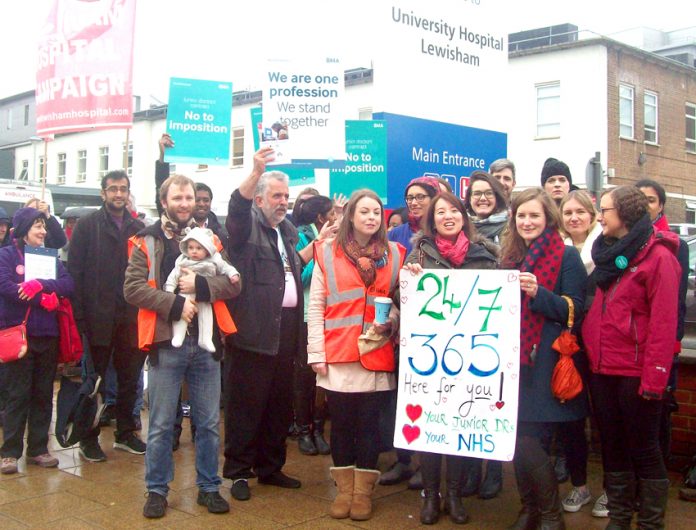AN ESCALATING programme of five-day strikes, every month until the end of the year, has been authorised by the BMA, as junior doctors take Health Secretary Hunt head on, determined to stop him imposing the latest contract which they rightly insist is unfair and unsafe for patients.
The first five days of strike action will take place in September, each day starting at 8am until 5pm, and then repeat every month until the end of the year. Dr Mohammed Latif, a junior doctor working at the Royal London Hospital, told News Line: ‘The contract due to be imposed is incompatible with an efficient or feasible NHS.
‘Despite the leaks from the Department of Health that there are too many risks involved with the seven-day service without any extra funding or staffing, the government is still hell-bent on pushing this contract onto doctors.
‘The only way we can support those who are standing up to the government is to escalate the action. Nobody likes to strike, but when things have come to this we sadly have no choice. The NHS is just one of the many public services under attack and it is only one example of where the government has failed the people.
‘We are all in this together and everyone across all unions should band together and stand up together with joint industrial action. The TUC is the largest union organisation with significant membership, it should not shirk with a stance regarding the NHS. That is why we need to get lots of health workers and junior doctors to the lobby of the TUC.’
The Young Socialists have called a lobby of the TUC to take place at 8am on Monday September 12 outside the Brighton Conference Centre, where the TUC is meeting. The lobby will demand that the TUC call an all-out indefinite general strike as the only way to defend the NHS. Dr Mohamed Mohamed told News Line: ‘Escalation is necessary.
‘It is with genuine difficulty that we have come to this impasse and it is with a heavy heart that we feel obliged to continue this action. If they impose this in October it will first and foremost affect those on the front line.
‘It is a contract which has been proven by its own instigators to be detrimental to the service. It would be a genuine help to get our point and message across if other unions felt so obliged to come out on strike with us.’
King’s College Hospital junior doctor, Dr Patrick Earls, said: ‘There is a clear change in the mood in this country in relation to the growing inequality. You can see it in Theresa May’s rhetoric. She is using this one nation rhetoric she doesn’t believe in.
‘But it shows that there is quite clearly a growing division between the haves and the have-nots and something is going have to give. The NHS is one of the last examples of universality which is left. Once that crumbles, there is no real common thread between us all.
‘It is absolutely essential to beat Health Secretary Hunt over this contract. The morale in the NHS is low. Nursing numbers are plummeting, there is huge shortage of nurses. The nurses’ bursaries are being cut. There are massive rota gaps, reduced numbers going to study medicine.
‘The way Hunt is treating us is fracturing the morale and the goodwill which the whole NHS depends upon. Every single person who relies on and values the NHS must understand that it is at breaking point and that what they can do to ensure its survival is to support those who are fundamental to the running of the NHS: doctors, nurses, radiologists, porters, cleaners.
‘People need to realise how easily it can all unravel and how impossible it will be to rebuild the NHS once private interests are entrenched in it. This contract will either be imposed or it will be scrapped and across the board.’
Joe Harris, a fifth-year medical student, said: ‘The consideration of further strike action is a strong showing of resistance by junior doctors, who along with medical students widely refused to accept the imposition of a revised contract that did too little to protect patients and doctors from dangerous cuts.
‘It’s vital that the public know that this action is for the benefit of patient safety and for the preservation of an NHS free at the point of use without private interference. Efforts by the government to undermine a creaking service already propped up by hardworking professionals will be strongly resisted.
‘Strikes of this nature are an unfortunate but necessary means of protecting a service which ranks among the best in the world despite being dangerously underfunded.’
